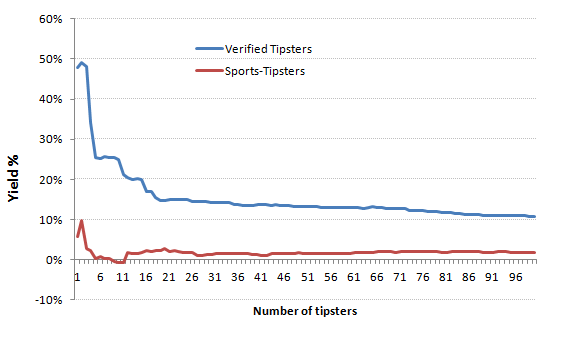The VerifiedTipsters.com Scam
Posted 28th July 2015
I was first introduced to the work of VerifiedTipsters.com in 2011 when reporting on their forum the activities of a fraudulent seller of betting advice, Goaloverunder.com. Indeed, VerifiedTipsters devote a specific subsection of their forum to allow users to report cases of suspected scamming and fraud. The report I filed about Goaloverunder dealt with the manipulation of results compared to those VerifiedTipsters had published, and subsequently the creation of a fake monitoring service, Checkinsports.com, as an attempt to hide further duplicity. Like TipsterConnection, Goaloverunder gave the game away by using the same Google Analytics account ID for its 'independent' monitor. In retrospect, allowing its users to report on cases of fraudulent tipping offers the perfect cover for a monitor doing the same thing. Giving the impression that you care about honesty and transparency must surely mean that you follow those principles yourself, right?
It was not until December 2013 that my suspicions began to be aroused when I came across a forum post where the management of VerifiedTipsters had proudly announced that it had reached the landmark figure of 60,000 verified tips since 2007. I decided to ask for the aggregated yield for those tips. The figure was 5.1%. This is considerably larger than the equivalent figures for other larrge tips data sets. Pyckio's average is around -2% (on account of using just one bookmaker), whilst my own record of tips verification back to 2001 as well as that found on the Oddsportal tipping community is around 1% (since the use of all bookmakers is permitted). Those figures are predictably an expression of the efficient market hypothesis. Across a large number of bettors, the vast majority who are simply tossing coins randomly, value expectation should be somewhere close to zero where bettors have access to best market prices. Naturally, there are three possible explanations for this significant discrepancy: 1) the services VerifiedTipsters attracts for verification are disproportionately better than elsewhere; 2) this sample has been exceptionally lucky; 3) the figures are manipulated. The first option seems improbable, for we would need a good explanation as to why VerifiedTipsters alone has managed to achieve what no other network has (without cheating), given that it passively accepts tipsters for verification rather than actively recruiting them. Regarding the second option, given that my own verified records contained a period between 2005 and 2008 of 70,000 picks with an aggregated yield of 3%, I was not entirely prepared to discount it. Others at the time, however, were less tolerant. BettingXpert.com, one of its monitored services, had already departed arguing that some of its tipsters, belonging to the same umbrella groups, were reporting performances that appeared to be beyond the realms of possibility.
The issue was revisited in August 2014 when VerifiedTipsters reached the landmark of 80,000 verified tips. The aggregated yield was 4.8%. This time I decided to probe a little further by accessing VerifiedTipsters own records they make available through their main website. I counted 78,617 picks (the difference, presumably, can be explained by bets that had been void and not included in the summary figures) from 295 service records which showed a yield of 6.8%, 2% higher than that reported by the management. (It subsequently acknowledged that it might have made a mistake.) When standardising for the variable stake sizes that different tipsters use, that figure actually rises to 7.1%. For me it was no longer conceivable that this represented something honest. It was time to do a little detective work.
VerifiedTipsters claims to have grown out of a Ph.D. thesis completed by the website manager, a Mr. Greg Wilson, on internet sports gambling under the supervision of Professor Neil Keegan, back in 2007 . One of the issues raised in Greg's thesis was the increasing number of fraudulent services that were selling picks over the internet. I asked him if I could access a copy of his thesis and perhaps talk with him and Professor Keegan about their research. For my efforts to uncover the truth I was banned from the forum. As confirmed by other leading academics I approached in the field of gambling and betting economics, there is almost certainly no Professor Keegan and no Ph.D. thesis. In my opinion it has all been concocted to give credibility to VerifiedTipsters' project. In fact the reference to Mr. Wilson's Ph.D. was not actually added to the website until the spring of 2013, nearly 6 years after it was first opened. Why the wait? Furthermore, academics embrace opportunities to talk about their work, not censorship.
I continued my investigation into VerifiedTipsters publically via the BettingAdvice.com forum, inviting others to join me in following various lines of thought to test the allegation that was now being made, that in fact it was composed of two parts: its own (in-house) paid services that manipulate records when they have no subscribers and some honest services to dilute the effects of the first group and provide an air of credibility to the project. Being a monitoring service, such a strategy would be almost impossible to prove without admission that it was taking place. When one customer joins any manipulated service its performance will be reported honestly. When they leave, the monitor is free to embellish the results until new ones are attracted. The services I now suspected to be involved – BetAttitude, EliteTipsters, EuroPunters, PanosKnowsBest, ProBetTrader, Tzogosteam and VIPTipsters being the main ones – invariably had high subscription fees and more often than not charged by the tip or small bundle of tips. Consequently, subscribers would be few in number and the length of a typical subscription short, providing plenty of opportunity to enhance the results when no-one is following. So long as there are enough services participating in the scam, this will guarantee a very healthy income.
In addition to their high fees, suspicious services had a number of other aspects in common. Firstly, they each had several subscription packages available to choose from, usually defined by the specialist tipster who was running it. Consequently I counted at least 58 different records that could have been manipulated; there may have been others. Secondly, the number of monthly picks was almost always small, averaging around 15 per month compared to nearly double that for the rest. Presumably, when tipsters are simply guessing this helps to increase the variance in reported monthly yields and ensures more of them will show profitable returns even for periods during which services have subscribers and reporting of results is honest. Thirdly, every one of these 58 packages was in profit. Aggregated together they accounted for a yield of 14.5% from 34,543 tips, or about 44% of the total number verified at the time I performed the analysis (14th September 2014). By anyone's reckoning such a return on investment from average betting odds that were close to evens would be truly unprecedented. The remaining 237 services, of which 116 (or 49%) were profitable, exhibited an aggregated yield of 1.5%, much more in line with other data sets I have reviewed. Conceivably if there are still a few more manipulated records I've not accounted for within this sample, removing those would lower that figure further. Fourthly, first-month performance for a large proportion of the tipsters I suspected was profitable. New advisory services generally take a bit of time to acquire some customers. Many bettors like to wait and see how a tipster performs before taking the plunge with money. The first month is the one least likely to have any, and hence is the month most likely to see manipulation. In fact 53 of the 58 records exhibited profitable first months. A priori, if tipsters are guessing, we should expect close to half to be so, as was the case for the other 237 records (with 129 or 54% showing positive first-month returns). The probability of this happening by chance is about 1 in 50 billion. Even if we accepted that these 58 tipsters were consistently capable of returning a 15% yield from betting 15 even-money picks per month, the odds that so many would be profitable in their first month is still in the region of about 700 to 1. Finally, the start of verification almost always coincided with the initiation of the service. Around half of the tipsters I have verified already had pre-existing records. Indeed, this survivorship bias is precisely the reason why so many then opt to seek verification in the first place. Furthermore, almost none of these 58 services showed their own results, but instead directed users straight to VerifiedTipsters.
A valid counterargument to this circumstantial evidence is that I've simply mined the VerifiedTipsters database to find excessively profitable services to create a case. Of course, we could do precisely the same in any large data set of tipsters and find samples with above average performance. Presumably, however, such samples would lack the other similarities and consistencies I've highlighted. Moreover, we are still left having to explain the extraordinary 7% aggregated yield that flies in the face of standard efficient market theory. Nevertheless, if other evidence existed this would surely support the case being built. Fortunately, there is plenty of other circumstantial evidence that doesn't simply rely on statistics.
All the websites suspected of participating in this alleged scam have similar website designs. Furthermore, most have low traffic (as estimated by Alexa.com) and just two significant inbound links. The first is the BettingAdvice forum page where I was conducting my investigation, the second is VerifiedTipsters. Presumably, services genuinely independent from their monitoring company would show more inbound links than this. There were similarities in content too. Like VerifiedTipsters, ProBetTrader.com also indulged in some academic eulogy with all four of its tipsters completing degrees in either Greek or UK universities in economics, finance and accounting. Sadly British data protection rules have meant I cannot determine whether these degrees were ever completed by the named individuals. Almost certainly, like Greg Wilson's Ph.D., all of it is a massive fabrication. The owner of the website, Athens-born Mr. Gregory Pappas (note the first name) is alleged to have graduated from the University Of Piraeus and the London School of Economics, before working as a 'stoke-broker' (his spelling, not mine) and more recently a finance manager. Like Professor Keegan, who became a grandfather in September 2013 (as announced on the VerifiedTipsters forum), Gregory Pappas evidently also liked talking about his family, being married with three children. Are these coincidences? Hmmm.
Gregory Pappas, in fact, is the domain registrant for ProBetTrader.com. He's also the registrant for BetAttitude.com, a partner website to ProBetTrader, and is listed as residing in Athens, Greece. Both websites were registered in the summer of 2006, just over a year before VerifiedTipsters.com was anonymously registered. Both services were some of the earliest to be monitored by VerifiedTipsters and they continue to be so today. Another was called DailyPunter, who at the time used a Blogspot domain. He was later to join Tzogosteam. ProBetTrader has been built with the Website5x.com design software. Nothing interesting in that you might say, until we discover that so were EuroPunters.com, PanosKnowsBest.com and Tzogosteam.com. All were registered anonymously between 2008 and 2009 and all continue to be monitored today. Furthermore, EuroPunters.com and PanosKnowsBest.com use the same company to protect domain privacy: Privacy Protection Service INC, Nobby Beach, Queensland, Australia, exactly the same as for VerifiedTipsters.com. Tzogosteam.com uses a different one, but the registrant is from Athens. ProBetTrader also uses a forum supplied by Simplemachines.org, exactly the same as VerifiedTipsters. Are these coincidences? I'm really struggling to believe so.
One final piece of evidence came by way of Netcomber.com, a "fingerprinting tool... mapping owner networks all over the internet [to] tell you what other sites are being owned by the same person." One of VerifiedTipsters monitored services goes by the name of Jeff's Horse Racing Selections. Over the years, horse racing appears to have been a specialist favourite of some of VerifiedTipsters' participating advisory services, presumably to attract the UK customers. Both EuroPunters and ProBetTrader offered it as a package. EuroPunters finally dropped their racing service when 'Brian', an elderly gentleman from the UK in charge of the service, decided to retire. Given that his performance was superior to Patrick Veitch's (Britain's most feared horse racing punter who's made millions off the bookies) I wanted to get in touch and try to encourage him out of retirement and work for me. Sadly, EuroPunters weren't able to assist; funny that. Anyway, Jeff's been going since December 2013, and performing fairly well. He doesn't use a website, but rather operates simply via an e-mail. That's a pattern that's become increasingly common at VerifiedTipsters in the last 18 months. Today he prefers horsenugger@gmail.com, but in February 2014 was using " target="_blank">horsenugger@hotmail.com,. One day in January 2015 I happened to be putting VerfiedTipsters.com in to the Netcomber machine and outputted four e-mail addresses sharing the same e-mail account:
- billing@verifiedtipsters.com
- support@verifiedtipsters.com
- service@verifiedtipsters.com
- horsenugger@hotmail.com
Well, well; is that the smoking gun? It's hard to say for sure, since it's unclear just how reliable Netcomber is and exactly what 'shared account' actually means. Nevertheless, at the very least it is further strong circumstantial evidence for what may have been going on. Unfortunately Netcomber is no longer active, but for those doubting the authenticity of my account I have saved a screenshot. Jeff also says he's open-minded to business proposals. I got in touch on several occasions asking if I could buy his tips and whether he'd like to work for me. Evidently he was not too open-minded towards my proposal. The only reply I ever received from him was to tell me that he'd found all my mail in his spam folder and that he didn't accept new customers. I wonder why he didn't say that on his VerifiedTipsters profile page. All in all, I attempted to contact a number of VerifiedTipsters' suspect services with requests to purchase tips. Only one other ever bothered to respond. That was Tzogosteam, who wondered why I would want to buy from a site that I believe to be a scam. Of course, I had never told Tzogosteam that I did. Evidently someone else had told them. How probable would that have been if it had been truly independent from its monitor I was investigating?
Judging by all this circumstantial evidence it would appear that the independence of VerifiedTipsters has been compromised from the very beginning. Indeed, I think it is not unreasonable to suggest that its very rationale came, not out of a Ph.D. researching online scamming and fraud in the world of sports tipping, but to commit it itself. An internet search yields links to other pages, some dating from several years ago, where rumours of VerifiedTipsters' dishonesty are discussed. Additionally, other parties have informed me that the e-mail they used to register with their service appeared to have been immediately forwarded to other services for the purposes of spamming. And one individual contacted me bemoaning the fact that he'd lost as much as €10,000 purchasing and betting tips from services monitored by VerifiedTipsters. The story was always the same: their "effectiveness" dropped as soon as he'd made a purchase. He also speculated why the odds he backed did not shorten if these services were so good: "because nobody except me was playing them."
Evidently, it took some time for the honest part of VerifiedTipsters' verification service to develop sufficiently to conceal the clues of its manipulation, and presumably before that nobody had been bothered to look. Perhaps it only dawned on the management slowly that having other legitimately verified tipsters amongst their own offered an excellent means of hiding the giveaway statistics. The chart below, for example, shows the cumulative yield for the first 100 tipsters verified by VerifiedTipsters, ordered chronologically by when they first began verification, for tips up to the 14th September 2014. By comparison, I have shown the same for my own verification service, Sports-Tipsters.co.uk. It's fairly obvious which one is natural and which contains an abundance of manipulated data.

If real, just how much revenue could have been realised by such a scam. A back-of-an-envelope estimate reveals a comfortable living can be achieved. Assuming no more than a couple of customers are subscribing to a service at any one time, and for only 6 out of 12 months, 58 different services doing the same thing typically charging €100 for a basic package of tips could realise a significant 5-figure annual income. This may well represent an underestimate. Is it any wonder that the original suspects who joined in the earliest years are still going strong today?
Nearly a year on since I first asked to see a copy of Greg Wilson's infamous Ph.D., there has still never been an admission of guilt (and no Ph.D. ). There's never likely to be either, given the difficulty in catching the perpetrators of such charlatanism. Denial is always the favoured response. The management once said: "Did you ever witness any change on a tipster's records even years after the time of your subscription?" Of course, that's simply stating the obvious. Given the nature of such a scam, we're not likely to see any changes because manipulation only takes place when no-one else is looking. As for Lance Armstrong who famously and consistently argued that he'd never failed a drugs test, absence of proof is not the same thing as proof of absence.
This article is also available in PDF which has been taken from my forthcoming book: Squares & Sharps, Suckers and Sharks.
|






